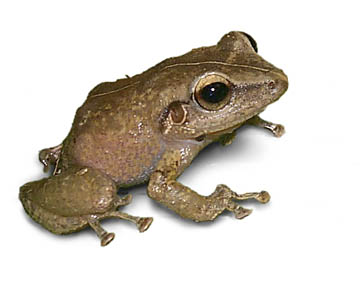
The noisy coqui frog, shown here, is a threat to Hawaii's native species.
$7 million sought to
fight coqui frogsU.S. Rep. Ed Case is asking the
federal government for help
HILO » U.S. Rep. Ed Case is getting involved in the fight to rid Hawaii of noisy coqui frogs, asking the federal government to contribute $7 million to help combat the invasive species.
Case, who made the requests to subcommittees overseeing the Agriculture and Interior departments, said Congress is aware that invasive species is a problem, not just for Hawaii, but nationwide.
Case (D, rural Oahu and neighbor islands) said there is increasing support to fight the problem.
"If we can specifically get funding for coquis, that would be great," said, noting there was funding this year and the Hawaii battle is part of a national effort.
"I'm optimistic because the right effort is being made by the right people," he said.
Case said Rep. Wayne Gilchrest, R-Md., chairman of the House Committee on Resources' subcommittee on fisheries conservation, wildlife and oceans, visited Honolulu on April 15 to hear about the growing problem of invasive species in Hawaii.
Last month, Big Island Mayor Harry Kim declared a state of emergency because of the island's coqui frog infestation. Maui and the Big Island have seen an increase in the pesky frogs, while Kauai and Oahu have eradicated them.
"We share on behalf of our mutual constituencies a great concern with invasive species generally and the worsening coqui frog infestation specifically," Case told Kim in an April 26 letter informing him of his funding requests.
Case has requested $500,000 each for Hawaii and Maui counties to control and eradicate coqui frogs and greenhouse frogs, and $950,000 for Hawaii Wildlife Services to help control the spread of the frogs, as well as to protect military and civilian aircraft from collisions with birds and other wildlife in Hawaii and Guam, protect endangered Hawaiian waterbirds from introduced predators and prevent the spread of brown tree snakes from Guam to other areas, especially Hawaii.
Case also has asked for $5 million for the U.S. Fish and Wildlife Services to expand its ongoing efforts to address invasive species in Hawaii, and asked for $240,000 for a cooperative agreement with the Hawaii Agricultural Research Center and the National Wildlife Research Center Hilo Field Station to control wildlife, including the coqui frogs.
Case has also requested that the National Park Service be authorized to use its funds to control invasive alien species outside Hawaii Volcanoes National Park that threaten the park's ecosystem.
Case said Congress has not yet passed its budget resolution, which will determine discretionary funding.
The coqui frog is about the size of quarter and emits a piercing, shrill sound that makes sleeping difficult for some people. It also threatens to destroy native species in Hawaii by eating them and their food.
Coqui frogs, beloved in their native Puerto Rico as a symbol of the island, likely ended up in Hawaii in shipments of tropical plants.
— ADVERTISEMENTS —
— ADVERTISEMENTS —
